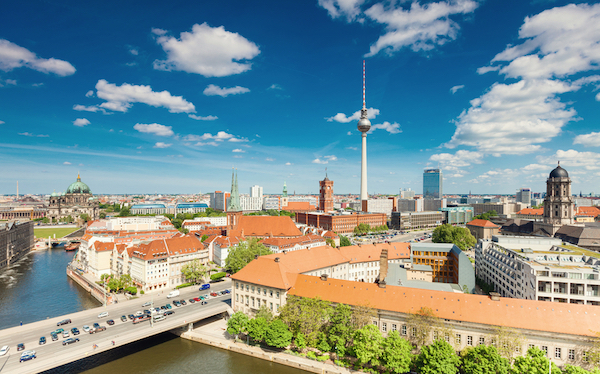Germany Could Develop A Car-Free Zone In Berlin That’s Larger Than Manhattan

Image ID 26191219 © via Berlinpictures | Dreamstime.com
Germany has often been synonymous with the automotive industry, and for good reason. Most have heard of the autobahn, where one can cruise down the highway with no speed limit. Perhaps even the mere mention of brands such as Volkswagen, Audi, BMW, and Porsche conjure up associations with the country.
Despite having one of the highest rates of car ownership in the world, at 574 vehicles per 1,000 residents, a group of citizens has come together for an ambitious plan: to make a 55-square-mile area of Berlin’s city center car-free.
According to GreenBiz, the Volksentscheid Berlin Autofrei (People’s Decision for Auto-Free Berlin) wants to ban vehicle use within the Ringbahn, a 23-mile rail loop stretching across the city, encompassing more than twice the size of Manhattan.
At the moment, the group has amassed 50,000 signatures in favor of the initiative.
One of the main reasons for this crusade is, of course, climate change. Thomas Howie, a member of the group, explained that while Berlin isn’t situated near a rising ocean, it is still affected by droughts or lowering water tables in the city.
“Although Berlin and Brandenburg seem like they are covered in water [as the area has many lakes], you can already observe the effects of the lowered water table; many trees are dying in our city,” Howie told the site.
“It is highly likely that water prices will climb significantly in the medium term. This will impact all of us. More worryingly, extreme heating events, such as the 2003 heat wave, which killed thousands in Paris, will happen more often,” he added.
According to Fast Company, the effort has caught on with the Berline Senate, which is now considering the plan. By February, it will decide if to adopt the idea by writing it into law.
The group said that should it be rejected next month, it would continue gathering signatures, hoping to reach 175,000 supporters in order to go on the ballot in 2023, where the city’s residents will decide if it should come into effect.
Despite the banning of cars, the initiative has come up with concessions for those who need private transport options. Rental vehicles will still be allowed, and those with disabilities who require private vehicles will be exempted from the ban.
“The car was a cultural asset perhaps in the ‘60s or ‘70s, when a certain generation [was] offered something new,” explained Howie.
“Today, a younger generation [is] focused on living in cities that are livable and pleasant to be in and, more important, stopping climate change that threatens future generations’ existence.”
[via GreenBiz and Fast Company, cover image via Berlinpictures | Dreamstime.com]



